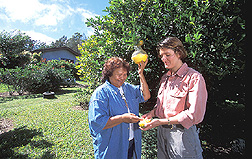This page has been archived and is being provided for reference purposes only. The page is no longer being updated, and therefore, links on the page may be invalid.
|
Read the magazine story to find out more. |
Senior Gardeners Helping to Save Hawaiian AgricultureBy Kim KaplanFebruary 17, 2004 Hawaiian senior citizens who garden are helping the state's farmers solve a big pest problem--controlling foreign fruit flies that devastate the harvest for every grower, large and small. The Agricultural Research Service is leading a cooperative effort in Hawaii to suppress Mediterranean, Oriental, Malaysian and melon fruit flies that lay eggs in and damage more than 400 fruits and vegetables, many of which are raised by backyard gardeners. An area-wide fruit fly control program, led by the ARS U.S. Pacific Basin Agricultural Research Center in Hilo, Hawaii, in cooperation with the Hawaii Department of Agriculture and University of Hawaii, has been having remarkable success suppressing these tiny but terrible pests among large and small commercial growers in Hawaii. But home gardens often act as reservoirs of fruit flies, and achieving real control requires preventing these reservoirs from supplying new generations of the pests. For this reason, ARS researcher Hannah Revis began meeting with the Kohala Senior Citizens Club, many of whom are avid gardeners and who were willing to be cooperators in a fruit fly control pilot test and then to demonstrate the system to other gardeners. Revis is teaching them how to apply the control program, which relies primarily on a system of field sanitation, biological controls and traps with lures, rather than on chemical insecticides. You can read more about the fruit fly control research in the February issue of Agricultural Research magazine. ARS is the U.S. Department of Agriculture's chief scientific research agency. |


